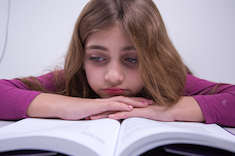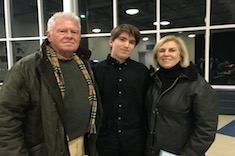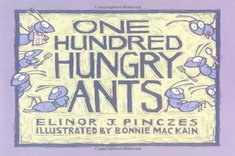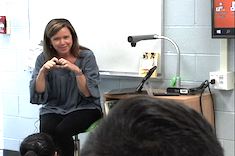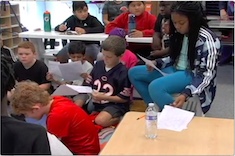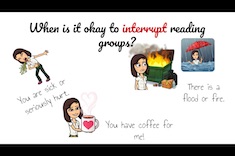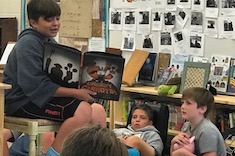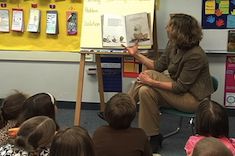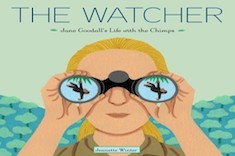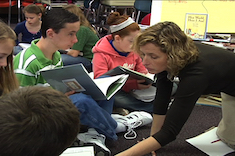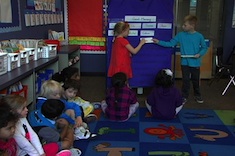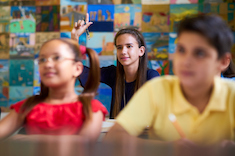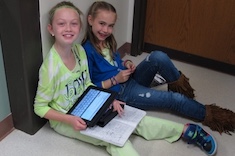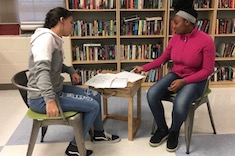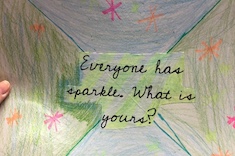Community Building
It's one of the big paradoxes of literacy instruction - students best learn how to read and write independently when they have a strong community of support in classrooms. How teachers build those thoughtful, kind, and challenging classroom communities is explained in these resources.
Latest Content
Trauma and Literacy
Jen Schwanke remembers her own experiences with trauma as a scared young girl, and how one kind teacher made all the difference in putting her on the path to healing. This makes her ponder the power of literacy in reaching wounded students in our midst.
Appointment Clocks
Gretchen Schroeder uses “appointment clocks” to ensure her students meet with a variety of peers for partner work.
Community Timeline Project
Katherine Sokolowski uses the Community Timeline Project to bring together students and older community members around history and writing. Includes a downloadable interview guide to help students record the interviewee’s life story.
Reading and Writing for the 100th Day of School
The 100th day of school has become an opportunity for classroom and schoolwide celebrations. Shari Frost provides many resources to ensure reading and writing are front and center on this special day.
Reinforcing Workshop Norms
In this quick video, Dana Murphy shows how she leads her fifth graders with a kinesthetic reminder of workshop norms before beginning independent work.
Circle Share
Sometimes “winging it” because we don’t have plans can lead to the most profound learning. Dana Murphy dreams up a quick circle share, and what follows is magic.
Minimizing Interruptions During Workshops
Dana Murphy explains why a system for minimizing interruptions is essential in her fifth-grade classroom, and how she keeps the process of creating and using it as simple as possible.
Raising Student Voices: Mentor Texts
Helping students find and raise their voices so that they can someday change the world is one of the most important things we do. Cathy Mere shares some of her favorite mentor texts for this essential work.
Moving from Interactive Read Alouds to Book Clubs
Tammy Mulligan shares how teachers can move seamlessly from thoughtful conversations during whole-class read alouds to lively book clubs.
Read Aloud in Middle School
Katherine Sokolowski values read aloud for her middle school students and struggles to find time for them. Her solution? A picture book a day, better known as the #bookaday activity.
Grand Conversations and Read Aloud
Are your conversations during read aloud stilted or shallow? Tammy Mulligan recommends weekly “grand conversations” to spark more thoughtful talk. She provides the tools you need to get started in your classroom.
Jane Goodall Inquiry: Introducing Expectations
Katherine Sokolowski introduces her students to routines and expectations early in the year with a unit on Jane Goodall, including many short read alouds.
Interactive Read Aloud and the Whole-Class Notebook
Tammy Mulligan enhances the quality of the class read aloud and student discussions with the use of a whole-class response notebook.
Student Greeting
Students in the first-grade classroom of Bitsy Parks lead a morning greeting at the start of the day. It’s a quick activity to check attendance, build reading skills, and help students learn the names of classmates in the community.
Linking Literacy and Community at the Start of the Year
Tara Barnett and Kate Mills start with the poem “Where I’m From” to build community through literacy at the start of the year.
Strategies for Sustaining Student Attention
Jen Schwanke shares some strategies for sustaining student attention beyond just calling out a student’s name over and over and over again.
Forgetting and Remembering
In the end classroom management often comes down to students valuing the same things we do. Jen Schwanke has tips for how high school teachers can create a culture where there is better communication and more shared values.
Setting and Using Classroom Norms
Class promises, rules, and norms—most teachers set them at the start of the year. But how can we make sure students live them? Dana Murphy shares some tips from her fifth-grade classroom.
Homework: I Challenge You!
Heather Fisher helps a first-grade teacher create a homework challenge as a way to make the practice more meaningful and engaging for students and families.
Becoming More Inclusive
Every teacher wants to be more inclusive. But where do you begin? Melanie Meehan presents three practical starting points.
Whose Point of View Matters? Considering Multiple Perspectives
When it comes to including and understanding others, it may be hardest to empathize with those who disrupt or bully others. Tammy Mulligan shares her four favorite mentor texts for understanding students who are angry and lash out.
Fewer Books and More Options at the End of the Year
Cathy Mere considers the dilemma teachers face when the bookroom, library, and tech departments require books and devices to be returned late in the year . . . but there are still a few weeks of school. She shares many suggestions for fostering literacy and community when there are far fewer books in the room.
Who Owns the Learning?
An enthusiastic student response to an author visit inspires Christy Rush Levine to revamp her upcoming unit on craft moves to foster more student ownership.
Slowing Down
Bitsy Parks comforts a crying child after lunch, and realizes how essential it is to continually slow down the fast pace of learning in her classroom.
Secret Reader
Suzy Kaback marvels at a very young learner who is a “secret reader,” and this leads her to reassess the value of constantly celebrating new skills in school communities.
Reading Bingo
Gretchen Schroeder has developed a fun version of Reading Bingo to help students explore their identity as readers. The activity includes clever social media inspired options like creating memes and “bookstagram” posts.
An All-School Writing Project: Six-Word Memoirs
If you want to bring everyone in your school together around writing, you can’t beat the simplicity and fun of six-word memoirs. Jennifer Schwanke describes how she sparked enthusiasm for the project in her school.
The Magic That Might Go Down
Christy Rush-Levine decides to slow down in her classroom and engage more fully with a student who is a wiseacre and resistant reader. What happens next can only be described as magic.
Sharing Writing in a Class Celebration
Do celebrations matter? If you know Ruth Ayres, you know her answer is always a resounding YES. Here are her best tips for sharing writing in a class celebration.
Shoulders-Down Spaces
Suzy Kaback feels rising unease as a tourist in unfamiliar neighborhoods. The experience provokes empathy for students who find classrooms strange or uncomfortable.
Browse Content By
Type
Category
- Assessment Tools
- Big Fresh Archives
- Booklists
- Choice Numeracy
- Classroom Design
- Common Core
- Community Building
- Conferring
- Content Literacy
- Digital Literacy
- English Language Learners
- Equity
- Family Relations
- Free Samples
- Guiding Groups
- Leadership
- Literacy Coaches
- Mentor Texts
- Minilessons
- New Teacher Mentors
- Podcasts
- Poetry
- Quote Collections
- Reading Strategies
- Self Care
- Struggling and Striving Learners
- Talking and Listening
- Teacher Study Groups
- Teaching Reading
- Teaching Writing
- Word Study and Vocabulary
Author
- Melissa Quimby
- Nawal Qarooni
- Gwen Blumberg
- Julie Cox
- The Lead Learners
- Hannah Tills
- Josie Stewart
- Ruth Metcalfe
- Mallory Messenger
- Becca Burk
- Jodie Bailey
- Vivian Chen
- Mary Brower
- Tiffany Abbott Fuller
- Stephanie Affinito
- Ruth Ayres
- Leigh Anne Eck
- Heather Fisher
- Shari Frost
- Julie Johnson
- Suzy Kaback
- Gigi McAllister
- Shirl McPhillips
- Melanie Meehan
- Cathy Mere
- Debbie Miller
- Tara Barnett and Kate Mills
- Tammy Mulligan
- Dana Murphy
- Bitsy Parks
- David Pittman
- Brenda Power
- Heather Rader
- Matt Renwick
- Mandy Robek
- Christy Rush-Levine
- Gretchen Schroeder
- Jen Schwanke
- Brian Sepe
- Katherine Sokolowski
- Stella Villalba
- Jennifer Vincent
Grade Level
Choice Literacy Membership
Articles
Get full access to all Choice Literacy article content
Videos
Get full access to all Choice Literacy video content
Courses
Access Choice Literacy course curriculum and training

